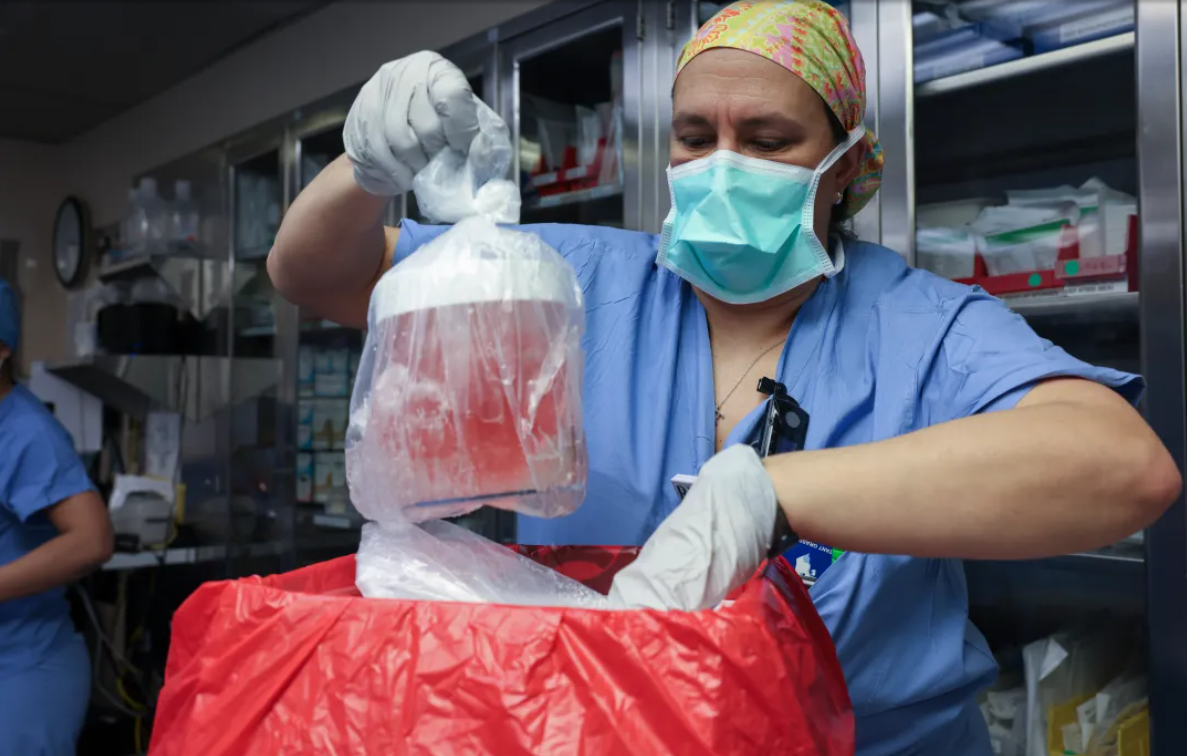世界首例:麻省总医院将猪肾移植到 62 岁韦茅斯男子体内

【中美创新时报2024年3月21日讯】(记者温友平编译)麻省总医院(Mass General Hospital)的医生将转基因猪肾移植到活体受体体内,这在世界上尚属首次。《波士顿先驱报》(Boston Herald)记者格蕾丝·佐科维奇(GRACE ZOKOVITCH)对此作了如下报道。
波士顿再次创造了医学历史。著名医院麻省总医院周四宣布,世界上首例成功将基因编辑猪肾移植到一名患有终末期肾病的 62 岁韦茅斯男子身上。
“在首次成功进行肾移植近七十年后,我们的临床医生再次证明了我们致力于提供创新治疗并帮助减轻我们的患者和世界各地其他人的疾病负担的承诺,”麻省总医院布里格姆(Mass General Brigham)总裁兼首席执行官安妮·克里班斯基(Anne Klibanski )医学博士说 。
麻省总医院的医生在周四上午的新闻发布会上表示,周六,教学医院的一组移植外科医生完成了为期四小时的手术,将转基因猪肾移植到了一位名叫理查德·“里克”·斯莱曼的人类患者身上。
麻省总医院表示,斯莱曼“恢复良好”,预计很快就能出院。
尖端的 CRISPR 技术在这次手术中发挥了关键作用。
剑桥 eGenesis 医院在一份新闻稿中补充道,该猪肾是由剑桥 eGenesis 的猪捐赠者提供的,“使用 CRISPR-Cas9 技术进行基因编辑,去除有害的猪基因,并添加某些人类基因,以提高其与人类的相容性”。
eGenesis 首席执行官迈克·柯蒂斯(Mike Curtis )在新闻发布会上表示:“我们致力于彻底改变器官衰竭的治疗方法,并将移植转变为对患者更加公平的系统,使供应不再成为获取的障碍。”
柯蒂斯说,跨物种移植是向每一位需要器官的患者提供器官的“最可扩展和可持续的方法”。这位首席执行官表示,该公司的愿景是“一个没有病人因等待器官而死亡的世界”。
MGH 肾脏科副主任温弗雷德·威廉姆斯 (Winfred Williams) 表示,这一突破对于解决“少数族裔患者获得机会不平等”的问题至关重要,这些患者面临着系统性障碍,导致肾移植方面存在巨大的健康差异。
根据国家医学图书馆 2023 年发表的一篇评论,黑人患者的终末期肾病、列入移植候补名单和接受活体捐赠者移植的发生率低于白人和其他人种。
威廉姆斯说,斯莱曼是交通部的一名系统经理,他一直在与糖尿病和肾衰竭作斗争。他说,他已经了解并治疗了这位患者十多年。斯莱曼患有糖尿病和高血压已有30年,并于2018年接受了人体肾脏移植手术,但最终失败了。
“今天真正的英雄是病人,斯莱曼先生,如果没有他踏上未知医学领域之旅的勇气和意愿,这项一度被认为难以想象的开创性手术的成功是不可能的,”麻省总医院移植中心主任乔伦·马德森博士(Dr. Joren C. Madsen)说。
“当全球医学界庆祝这一里程碑式的成就时,斯莱曼先生成为无数患有终末期肾病的人的希望灯塔,并开辟了器官移植的新领域,”医生补充道。
这名韦茅斯男子在一份声明中表示,他对麻省总医院拥有“最高程度的信任”。
“当我的移植肾脏在 2023 年开始衰竭时,我再次相信麻省总医院的护理团队能够实现我的目标,不仅改善我的生活质量,而且延长我的生活质量,”斯莱曼说。 “我的肾脏科医生、医学博士温弗雷德·威廉姆斯博士和移植中心团队建议进行猪肾移植,并仔细解释了该手术的利弊。我认为这不仅是一种帮助我的方式,也是一种为成千上万需要移植才能生存的人带来希望的方式。”
麻省总医院表示,根据联合器官共享网络 (UNOS) 的数据,美国有超过 10 万人等待器官移植,每天有 17 人在等待器官的过程中死亡。
该医院补充说,肾脏是移植所需的最常见器官,根据《美国肾脏病学会杂志》发表的文献,到 2030 年,美国终末期肾病发病率预计将增加 29-68% 。
“当我们看到第一滴尿液排出时,手术室里的每个人都爆发出热烈的掌声,”莱戈雷塔临床移植耐受中心主任、斯莱曼的主移植外科医生河合龙夫 (Tatsuo Kawai) 说道。 “这确实是我见过的最美丽的肾脏。”
题图:麻省总医院的医生将转基因猪肾移植到活体受体体内,这在世界上尚属首次。(麻省总医院照片)
附原英文报道:
World’s First: Mass General transplants pig kidney into a 62-year-old Weymouth man
By GRACE ZOKOVITCH | gzokovitch@bostonherald.com
PUBLISHED: March 21, 2024
Boston has once again made medical history.
The renowned hospital Mass General Hospital announced Thursday the world’s first successful transplant of a genetically edited pig kidney into a 62-year-old Weymouth man living with end-stage kidney disease.
“Nearly seven decades after the first successful kidney transplant, our clinicians have once again demonstrated our commitment to provide innovative treatments and help ease the burden of disease for our patients and others around the world,” said Anne Klibanski, MD, President and CEO, Mass General Brigham.
On Saturday, a team of transplant surgeons at the teaching hospital completed a four-hour operation transplanting a genetically modified pig kidney into the human patient, identified as Richard “Rick” Slayman, doctors from MGH said at a press conference Thursday morning.
MGH said Slayman is “recovering well” and expected to be discharged soon.
The cutting-edge CRISPR technology was pivotal in this operation.
The pig kidney was provided by eGenesis of Cambridge from a pig donor that was “genetically-edited using CRISPR-Cas9 technology to remove harmful pig genes and add certain human genes to improve its compatibility with humans,” the hospital added in a release.
“We are committed to revolutionizing the treatment of organ failure and transforming transplantation to a system that is more equitable for patients, where supply is no longer a barrier to access,” Mike Curtis, eGenesis CEO, said during the press conference.
Cross-species transplantation, Curtis said, is the “most scalable and sustainable approach” to delivering organs to every patient who needs one. The company’s vision is “a world in which no patient dies waiting for an organ,” the CEO said.
The breakthrough is critical to addressing “unequal access for ethnic minority patients,” who face systemic barriers resulting in wide health disparities in kidney transplants, said Winfred Williams, Associate Chief of the MGH Renal Division.
According to a 2023 review published in the National Library of Medicine, the incidence of end-stage renal disease, being put on the transplant waitlist and receiving a living donor transplants were lower for Black patients than White and other.
Slayman is a system manager at the Department of Transportation who has worked throughout his battle with diabetes and kidney failure, said Williams, who said he has gotten to know and treat the patient for over a decade. Slayman has had diabetes and hypertension for 30 years and received a human kidney transplant in 2018, which eventually failed.
“The real hero today is the patient, Mr. Slayman, as the success of this pioneering surgery, once deemed unimaginable, would not have been possible without his courage and willingness to embark on a journey into uncharted medical territory,” said Dr. Joren C. Madsen, director of the MGH Transplant Center.
“As the global medical community celebrates this monumental achievement, Mr. Slayman becomes a beacon of hope for countless individuals suffering from end-stage renal disease and opens a new frontier in organ transplantation,” the doctor added.
The Weymouth man said in a statement he had the “highest level of trust” in MGH.
“When my transplanted kidney began failing in 2023, I again trusted my care team at MGH to meet my goals of not just improving my quality of life but extending it,” Slayman said. “My nephrologist, Dr. Winfred Williams, MD and the Transplant Center team suggested a pig kidney transplant, carefully explaining the pros and cons of this procedure. I saw it not only as a way to help me, but a way to provide hope for the thousands of people who need a transplant to survive.”
According to the United Network for Organ Sharing (UNOS), more than 100,000 people in the U.S. await an organ for transplant and 17 people die each day waiting for an organ, MGH said.
A kidney, the hospital added, is the most common organ needed for transplant, and end-stage kidney disease rates are estimated to increase 29-68 percent in the U.S. by 2030, according to literature published in the Journal of the American Society of Nephrology.
“When we saw the first urine output everyone in the operating room burst into applause,” saidTatsuo Kawai, Director of the Legorreta Center for Clinical Transplant Tolerance and Slayman’s primary transplant surgeon. “It was truly the most beautiful kidney I have ever seen.”

